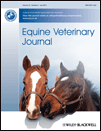
EQUINE VETERINARY JOURNAL
Scope & Guideline
Transforming equine care with rigorous research and reviews.
Introduction
Aims and Scopes
- Equine Health and Welfare:
Research focusing on the overall health and welfare of horses, including studies on disease prevention, management practices, and behavioral assessments. - Clinical Veterinary Practices:
Investigations into clinical practices, including surgical techniques, diagnostic imaging, and treatment protocols for various equine conditions. - Equine Sports Medicine:
Studies examining health issues related to performance horses, including injury prevention, rehabilitation, and the effects of training on equine athletes. - Reproductive Health and Management:
Research addressing reproductive issues in horses, encompassing fertility, gestation, and neonatal care. - Pharmacology and Therapeutics:
Studies evaluating the pharmacokinetics, efficacy, and safety of medications and treatments used in equine practice. - Infectious Diseases and Pathology:
Research into equine infectious diseases, including epidemiology, diagnosis, and treatment of pathogens affecting horse health. - Innovative Technologies in Equine Medicine:
Exploration of new technologies and methodologies for diagnosis and treatment in equine veterinary practice, including imaging techniques and bioinformatics.
Trending and Emerging
- Equine Metabolic Disorders:
An increase in studies addressing metabolic issues such as equine metabolic syndrome and insulin dysregulation, reflecting growing concerns about obesity and related health risks in horses. - Advanced Imaging Techniques:
Research utilizing advanced imaging modalities like MRI, CT, and ultrasound is on the rise, showcasing the importance of these technologies in diagnosing and managing equine conditions. - Regenerative Medicine and Therapies:
A notable trend towards regenerative therapies, including stem cell treatments and platelet-rich plasma applications, is emerging as a key area of focus in equine practice. - Behavioral and Welfare Assessments:
Research emphasizing the behavioral aspects of horse welfare is gaining traction, with studies exploring the impacts of management practices on equine mental health. - Infectious Disease Surveillance and Management:
There is an increasing emphasis on the epidemiology and management of infectious diseases in equines, particularly in light of global health challenges and biosecurity concerns. - Data-Driven Approaches in Veterinary Medicine:
The integration of data analytics and artificial intelligence in equine veterinary practice is emerging, with studies exploring their applications in diagnostics and treatment planning.
Declining or Waning
- Traditional Breeding Practices:
Research related to conventional breeding methods has seen a decline as more emphasis is placed on genetic testing and advanced reproductive technologies. - Generalized Equine Nutrition Studies:
Broad studies on equine nutrition are becoming less frequent, with a shift towards specific dietary interventions and their impacts on health and performance. - Basic Surgical Techniques:
There is a noticeable decrease in publications focused solely on traditional surgical techniques, as more complex and innovative approaches gain interest. - Standard Diagnostic Protocols:
Research focusing on standard diagnostic procedures is declining, with a growing preference for studies that evaluate novel diagnostic methods and technologies.
Similar Journals

PFERDEHEILKUNDE
Connecting researchers to enhance equine veterinary practices.PFERDEHEILKUNDE is a prominent journal dedicated to advancing knowledge in the equine veterinary field, published by Hippiatrika Verlag GmbH in Germany. This journal addresses various aspects of equine health, welfare, and medicine, ranking in the 13th percentile among peers in the veterinary equine category. With its convergence period from 1996 to 2024, it serves as a significant resource for researchers, professionals, and students alike, fostering a rich academic dialogue on veterinary practices and innovations. Although it operates on a standard access model, its importance in the realm of equine studies remains undisputed, contributing valuable insights and fostering advancements in equine health management. As the field continues to evolve, PFERDEHEILKUNDE plays a critical role in disseminating essential research findings that support the welfare of horses globally.

Revista Romana de Medicina Veterinara
Elevating the standards of animal health and welfare.Revista Romana de Medicina Veterinara is a leading peer-reviewed journal dedicated to the field of veterinary medicine, published by the General Association of Romanian Veterinarians. With its ISSN 1220-3173 and E-ISSN 2457-7618, the journal aims to advance the domain of veterinary science through dissemination of high-quality research articles, case studies, and reviews that cover a wide array of topics including animal health, veterinary diagnostics, and treatment methodologies. Although primarily focused on the Romanian veterinary landscape, its scope is designed to engage a global audience of researchers, practitioners, and students seeking to enhance their knowledge and practice in veterinary medicine. The journal is committed to open accessibility, ensuring that vital research is readily available to the academic community without financial barriers, thereby encouraging collaboration and innovation. By providing a platform for cutting-edge veterinary research, Revista Romana de Medicina Veterinara plays a crucial role in fostering advancements that can significantly impact animal health and welfare both locally and internationally.
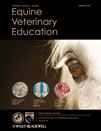
EQUINE VETERINARY EDUCATION
Enhancing equine welfare through research and education.EQUINE VETERINARY EDUCATION is a premier academic journal dedicated to the field of veterinary science, particularly focusing on equine health and education. Published by WILEY, this influential publication boasts a robust history, having served the academic community since 1989. With an impressive Scopus ranking within the top 4 of 11 in the equine veterinary category and a 68th percentile placement, it underscores its significant contribution to advancing knowledge in the field. Although it does not offer Open Access, EQUINE VETERINARY EDUCATION provides critical insights and research that inform best practices and innovative approaches in equine care and management. The journal aims to foster the development of veterinary education through high-quality research articles, reviews, and case studies, making it an essential resource for researchers, practitioners, and students committed to enhancing equine veterinary knowledge and practices.
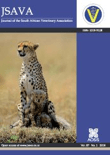
Journal of the South African Veterinary Association
Pioneering Research for Animal WelfareJournal of the South African Veterinary Association is a prominent Open Access journal dedicated to advancing the field of veterinary science since its inception in 1945. Published by MEDPHARM PUBLICATIONS PTY LTD, this journal stands out with an impactful HIndex and a commendable categorization in 2023, ranking Q3 in Medicine (miscellaneous) and Q2 in Veterinary (miscellaneous). With a Scopus rank of 96 out of 194 in the veterinary field, it serves as an essential resource for researchers, veterinary professionals, and students, promoting the dissemination of high-quality research and knowledge. The journal offers a platform for peer-reviewed articles covering diverse topics relevant to veterinary and animal health issues, encouraging expansive dialogue and collaboration within the academic community. Based in Centurion, South Africa, and accessible globally since it adopted an Open Access model in 1997, the journal exemplifies a commitment to accessibility and the sharing of knowledge.

Journal of the Hellenic Veterinary Medical Society
Exploring the frontiers of veterinary knowledge and practice.Welcome to the Journal of the Hellenic Veterinary Medical Society, a premier platform dedicated to advancing the field of veterinary medicine through high-quality research and scholarly discourse. Published by the Hellenic Veterinary Medical Society, this journal serves as a vital resource for veterinarians, researchers, and students who are committed to the advancement of animal health and welfare. With an ISSN of 1792-2720 and a recognized status in the community, the journal publishes impactful studies that contribute to the understanding of various veterinary disciplines. Although the journal currently sits in Q3 of the Veterinary (miscellaneous) category with a Scopus ranking of #157/194, it aims to elevate its reach and impact within the scientific community, fostering a culture of innovation and knowledge sharing. The journal strictly adheres to open access principles, ensuring that its findings are readily available to all, thereby promoting collaboration and comprehensive learning. By participating in this esteemed journal, authors and researchers contribute to the rich history and ongoing dialogue of veterinary science that dates back to its founding in 1953. We invite you to explore, engage, and contribute to the growing body of knowledge in veterinary medicine.
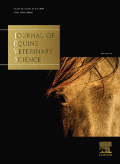
JOURNAL OF EQUINE VETERINARY SCIENCE
Pioneering insights in equine veterinary science.JOURNAL OF EQUINE VETERINARY SCIENCE, published by Elsevier Science Inc, serves as a premier platform for disseminating innovative research in the field of equine veterinary medicine. With an ISSN of 0737-0806 and an E-ISSN of 1542-7412, this journal has been a beacon of scholarly work since its inception in 1981, projected to maintain its commitment to excellence through 2024. Renowned for its rigorous peer-review process, the journal is currently ranked Q2 in the equine category, showcasing its significance in the veterinary field, particularly within the competitive Scopus ranks where it holds the 3rd position out of 11 evaluated journals, placing it in the 77th percentile. Although not an open-access publication, its contributions are accessible through institutional subscriptions, ensuring that vital research reaches a wide audience of equine veterinarians, researchers, and students. The journal aims to advance the understanding of equine health and welfare, making it an invaluable resource for those dedicated to improving animal care and advancing the science of veterinary medicine.

ISRAEL JOURNAL OF VETERINARY MEDICINE
Cultivating Insights for a Brighter Future in Animal HealthThe Israel Journal of Veterinary Medicine, published by the Israel Veterinary Medical Association, serves as a vital resource for researchers, professionals, and students in the fields of veterinary medicine and animal science. With a commitment to advancing knowledge across diverse veterinary disciplines, this journal plays a crucial role in disseminating significant findings and innovations that influence both local and global veterinary practices. Although it currently holds a Q4 ranking in both the Animal Science and Zoology and Veterinary (miscellaneous) categories, the journal's open access policy, enabling free availability of articles, aspires to increase its accessibility and engagement among the academic community. The journal's convergence of research from 2007 to 2024 showcases its dedication to continuously contributing to the evolving landscape of veterinary science.
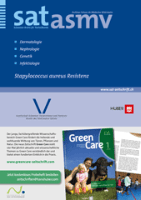
SCHWEIZER ARCHIV FUR TIERHEILKUNDE
Bridging knowledge and practice in veterinary medicine.SCHWEIZER ARCHIV FUR TIERHEILKUNDE is a prestigious journal published by the GESELLSCHAFT SCHWEIZER TIERARZTINNEN & TIERARZTE, dedicated to advancing the field of veterinary science. With the ISSN 0036-7281 and E-ISSN 1664-2848, this esteemed journal has been a vital source of knowledge since its inception in 1945, evolving through converged years up to 2024. It plays a significant role in the veterinary community, reflected by its 2023 ranking in the Q2 category for veterinary (miscellaneous) research, placing it within the 48th percentile among its peers. Although it does not currently offer Open Access options, the journal remains a trusted outlet for researchers, professionals, and students looking to stay abreast of the latest findings and practices in veterinary medicine. Published in Switzerland, it serves as a bridge for sharing innovative ideas and solutions in animal healthcare, emphasizing the importance of community and collaboration in improving animal welfare.

Iranian Journal of Veterinary Research
Exploring New Frontiers in Veterinary MedicineWelcome to the Iranian Journal of Veterinary Research (IJVR), a prestigious platform dedicated to advancing the field of veterinary science. Published by Shiraz University, this journal plays a pivotal role in disseminating high-quality research findings amid a vibrant academic community. With its ISSN 1728-1997, and a convergence of studies from 2008 to 2024, IJVR serves as an essential resource for veterinarians, researchers, and students interested in Animal Science and Zoology. Recognized in the Q3 quartile for both Animal Science and Veterinary categories, it holds a respectable position with Scopus rankings placing it in the 54th percentile among general veterinary journals. Although it currently lacks an open access model, the journal ensures that cutting-edge veterinary research is presented with rigor and relevance, fostering knowledge that contributes to animal health and welfare. With its strategic focus on innovative methodologies, clinical practices, and the biological sciences, the IJVR is set to become your go-to source for critical advancements in veterinary research.
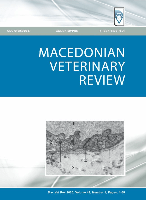
Macedonian Veterinary Review
Enhancing animal welfare through shared knowledge.Macedonian Veterinary Review is a prominent open access journal dedicated to advancing the field of veterinary science. Published by SCIENDO, this journal provides a crucial platform for researchers, professionals, and students to share their findings and insights related to veterinary practices, animal health, and welfare. Established with the aim of fostering knowledge exchange since its inception in 2010, the journal has made significant strides, evidenced by its 2023 Scopus ranking of #131 out of 194 in the General Veterinary category, placing it in the 32nd percentile among its peers. The journal's open access model enhances the dissemination of knowledge, ensuring that vital research reaches a wider audience, thereby addressing key issues in the veterinary landscape. With its base in Macedonia and a commitment to high-quality scholarly contributions, the Macedonian Veterinary Review is an essential resource for anyone involved in veterinary research and practice, reflecting the ongoing developments and challenges in this critical field.